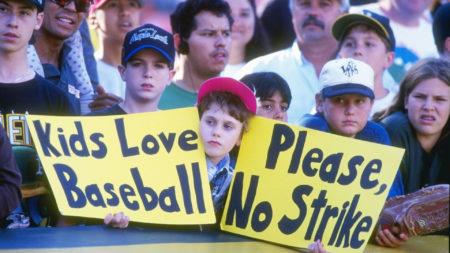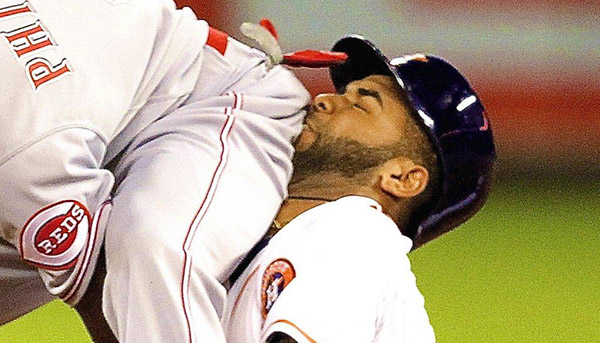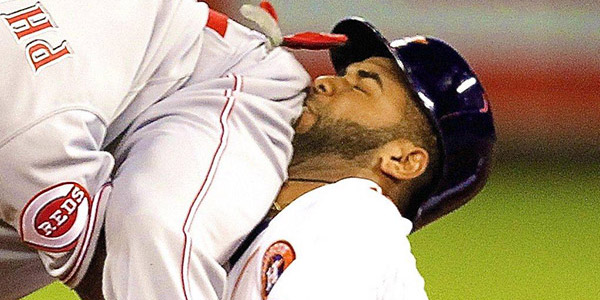Will There Be a Baseball Strike?
 Major League Baseball and its players have enjoyed over two decades of relative labor peace. That’s the good news. The bad news is that there are more and more whispers of the possibility of a work stoppage before the next Collective Bargaining Agreement.
Major League Baseball and its players have enjoyed over two decades of relative labor peace. That’s the good news. The bad news is that there are more and more whispers of the possibility of a work stoppage before the next Collective Bargaining Agreement.
It sounds silly at first glance with a league that’s making over $10 billion per year and has helped make thousands of players into millionaires.
However, last off-season we all saw players suddenly getting less than we thought in free agency.
Agents like Scott Boras started floating rumors of collusion from the owners.
And then this season the league as a whole actually lowered the amount of overall money paid to players for the first time in a long time.
There are real concerns here. You may have seen this tweet from the Phillies’ Jake Arrieta:
All of you 1-3 yr players out there better be paying attention to what’s going on in our game. You’re next. @MLB
— Jake Arrieta (@JArrieta34) January 12, 2019
Regardless of whether you think players should be happy to get anything to play a kids’ game or that owners are tyrannical money-grubbers, the two decades of peace have been a result of both sides working together.
Players are entertainers and they get paid to entertain. They are the product that is being sold and they deserve to get as much money as they possibly can from whichever owner is willing to pay. Just as you are in your field. Owners (for the most part) want to put out the best team they can and “sell” as much of the product as possible. This is all simple capitalism.
So, then, what’s the problem? Is it the owners? Is it the players? Nope. And Nope.
It’s the general managers.
That’s right. The GMs. Or the Presidents of Baseball Operations. Or whatever they’re called now. They’re the ones causing this strange problem where the middle class of available free agents have to settle for far below the market rate or risk not playing at all.
I don’t mean it’s their fault in a bad way. Teams are just getting smarter. Owners want the best teams they can get. But if an owner hires a GM that tells them to punt on the next couple seasons, build the farm system and only make low-risk contract offers, there goes one more team out of the bidding on middle class players.
Guys like Bryce Harper and Manny Machado are always going to get their $30 million per year. However, with more and more modern GMs trying to maximize the enormous value of young players and a number of teams tanking, very few teams have the need for a league average player.
Jed Lowrie was worth almost 3 Wins Above Replacement (WAR) last season. That’s about $27 million in value. He got a two-year deal for $20 million with the Mets. Yasmani Grandal has been the third best catcher in all of baseball the last three years and he also only got a one-year deal. His is for $18 million, but remember Russell Martin got a five year deal for $85 million just a few years ago. And he wasn’t the third best catcher in the league.
Then there’s guys like Mike Moustakas. This is a league average player who will help add 2 WAR to any team that signs him. Last off-season, he received almost no offers and wound up re-signing with the Royals for $8 million. And delivered 2.4 WAR. But he’s not a star like Manny Machado, so he has to wait and see if the teams that miss out on Machado have any interest.
It’s not just the tanking that’s causing this financial rift. GMs are bending over backwards to stay away from long-term contracts. Why? They’re too risky. For the team? Sure. But more so for the GM. If the player gets a huge payday and then bottoms out, it’s the GM who will be responsible. Major League Baseball contracts are guaranteed.
What happens if one of these big signings turns into Hanley Ramirez or Pablo Sandoval? Let’s ask the unemployed former GM of the Boston Red Sox. Ben Cherington signed them and was fired a year later even though he had GM’ed the team to a World Series title less than two years before.
In recent CBA negotiations, the MLB Players’ Association has given away a lot of its strength. It’s still a strong union, but it has made concessions to the owners that have hurt a lot more than they thought they would at the time.
Many writers lament that the owners are being cheap and are screwing the players by not paying them what they’re worth. Okay, but these are the same writers who ridicule a team for signing Chris Davis.
These are also the same writers who look to statistical projections and will tell you Team X is going to win 79 games and is the fourth best in its division. Right. So, then why should Team X spend $18 million on Mike Moustakas to get them to 81 games?
Smart teams know that this is a waste of resources. It’s not just the money, but the roster spot which could be used to take a flyer on a fringe prospect. He may flame out and the team moves on from him next season. But he could suddenly be a league average player—for a lot less than $18 million per year.
So, will there be a strike? It’s possible. But the GMs aren’t the only ones who are smart. The players are as well. They will always have the ultimate leverage. They’re the ones we all want to watch. The owners are making too much money to want to have a stoppage.
Let’s just double the league minimum for players, get rid of some of these weird arbitration deadline dates and call it a day. Oh, and while we’re at it, let’s find a way to pay minor leaguers more than $1,100 per month.

























